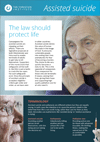A severely disabled man who is seeking to change the law so a doctor can end his life “deserves sympathy but hard cases make bad law”, a leading pro-life ethicist has warned.
Tony Nicklinson, 57, suffers from ‘locked-in syndrome’ and wants a doctor to end his life. He is paralysed from the neck down after having a stroke in 2005.
But Dr Peter Saunders of the Care Not Killing alliance warns against weakening the law because it would endanger the lives of some of the nation’s most vulnerable members.
Vulnerable
He said we “need to realise that cases like Nicklinson’s are extremely rare and that hard cases make bad law. The overwhelming majority of people with severe disability – even with ‘locked-in syndrome’ – do not wish to die but rather want support to live”.
Dr Saunders added: “The Murder Act is there in part to protect vulnerable people from exploitation and abuse by those who might have an interest, financial or otherwise, in their deaths.
“Any further removal of legal protection by creating exceptions for bringing prosecutions would encourage unscrupulous people to take liberties and would place more vulnerable people – those who are elderly, disabled, sick or depressed – under pressure to end their lives so as not impose a burden on family, carers or society.”
Hope
The British Medical Association has said it is “opposed to assisted suicide and to doctors taking a role in any form of assisted dying. We support the current law and are not seeking any change in UK legislation on this issue.”
Last August a mother of two revealed how she never lost her will to live after an illness left her paralysed and unable to speak for 18 months.
Kerry Pink was left suffering from ‘locked-in syndrome’ by an undiagnosed neurological illness when she was just 35.
Terror
Mrs Pink said: “I know that however dark the twilight world I inhabited, I never lost my will to live.”
She recalled how at one point during her illness she heard her doctors advising her husband Greg that she wouldn’t make it through.
Describing the moment she said: “I remember a flash of abject terror, then anger. I clearly recall thinking: ‘How dare they say I’m not going to pull through.’
“I don’t ever recall being worried that the doctors would allow me to die. I always had absolute faith that Greg would not let them.”



